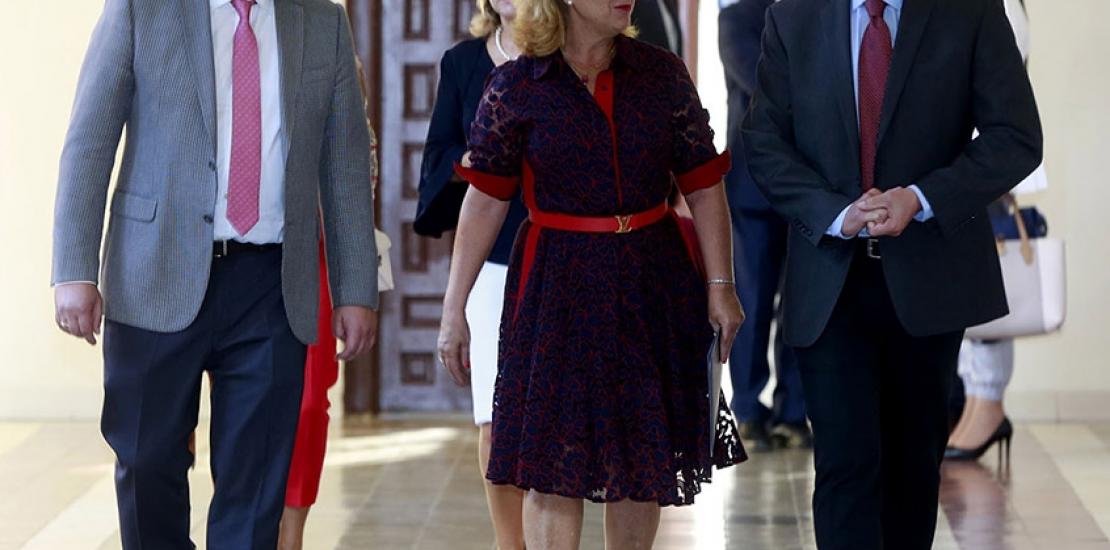The UCAM can count on the collaboration of Primafrio to finance the research of Juan Carlos Izpisua
"The constant support by the UCAM is something unusual because in our country research is not considered important, and this makes me proud of these four years of collaboration”. This is one of the ideas highlighted by Juan Carlos Izpisua, professor extraordinary of Developmental Biology of the UCAM, throughout the presentation of the project ‘Collaboration UCAM-Primafrio: an example of scientific patronage’ that was held this afternoon in Los Jerónimos Campus.
The international team of researchers led by Izpisua puts all its talent and dedication into finding a solution to hitherto incurable diseases that are related to cancer, diabetes, ageing or rare diseases (progeria, retinitis pigmentosa, etc.). For these researches to be carried out with continuity, the Primafrio Foundation, located in Murcia, decided to join through its patronage activity the Catholic University of Murcia, an institution that has been supporting Dr. Izpisua research for various years with human resources (researchers) and economic ones. This initiative is the result of a shared conviction: to believe in science as a tool for the aid and progress of humanity, and it pursues a common goal: to contribute so that these advances can bear fruits and reach the entire society, including the most vulnerable people.
At the event held in Los Jerónimos Campus, in which the patronage agreement was made public, Juan Carlos Izpisua was accompanied by Josefina García, chancellor of the Catholic University; Juan Conesa, president of the Primafrio Foundation; Isabel Fortea, director general of Universities of the Autonomous Community of the Region of Murcia (CARM), Estrella Núñez, vice-chancellor for Research, as well as by UCAM and Primafrio authorities, representatives of D’Genes and of the Hospital of Molina and researchers.
In this sense, the researcher also stated that “by altering the epigenome we can rejuvenate our organs and, therefore, we can delay ageing” and he specified that “during the last years, we have become aware of the fact that the epigenome is as important as the genome”. The genome is the book of life with which we come into the world and the epigenome consists in the punctuation marks that we write during our existence”.
During the presentation, the scientist added that “there is a solution to the diseases inherited from parents to children”.
For her part, Josefina García, chancellor of the Catholic University, stated that this collaboration with Primafrio “reinforces the University commitment to be a pioneer in the areas of health, food and sport”.
The chancellor also highlighted that “thanks to the example given today by the UCAM and the Primafrio Foundation, we will see great advancements in the coming years. Thanks for bringing the university closer to companies”.
For his part, Juan Conesa, president of the Primafrio Foundation, expressed his pride for “collaborating with the UCAM in this project together with Dr. Izpisua and we hope that other companies will follow this path”.
Juan Conesa emphasised the fact that it is “the greatest initiative carried out by the Foundation”.
Isabel Fortea, director general for Research and Innovation of the CARM, pointed out that “thanks to the example given today by the UCAM and Primafrio Foundation, we will see great progress in the coming years. Thank you for bringing the University closer to companies”.
Fortea also stressed the importance of boosting active patronage in the research area.
Estrella Núñez, vice-chancellor for Research at the UCAM, highlighted “the collaboration that the Catholic University has been carrying out for the last four years with Doctor Izpisua”.
Núñez thanked Primafrio for “believing in research as a tool to carry out a sustainable and responsible development of our society” and she added that “may this example encourage other businessmen in our Region to carry out this kind of actions”.
The vice-chancellor also recalled the strong commitment of the Catholic University of Murcia for research, a field in which it invested more than 16 million euros the last year 2018.
In this regard, she also highlighted that the results of the research projects with Juan Carlos Izpisua have been published by the most prestigious scientific journals in the world, such as Cell, Science or Nature (more than 30 articles), as well as by the general-interest media of maximum global spread.
The UCAM works with Juan Carlos Izpisua in different research lines
To reverse ageing
Use of gene editing techniques to make epigenetic modifications and, without the need to cut the DNA, activate genes that have been deactivated by ageing, thus reversing associated diseases such as diabetes, kidney disease or muscular dystrophy.
Organs regeneration
To integrate human iPS cells into pig embryos so that the embryo itself generates a specific organ with the human cells inserted. The ultimate goal of this project is to obtain human organs for transplants.
Tools against rare diseases
Design and improvement of gene editing techniques that allow to repair mutant genes in adult cells, which do not divide, and thus cure diseases produced by genetic alterations, such as retinitis pigmentosa or progeria.
Cure for multiple sclerosis
Obtaining specific iPS cells from each patient helps to understand the mechanisms underlying the development of the disease, as well as to open up the possibility of testing drugs and compounds that may be specific for each patient.
Muscle regeneration
The UCAM and the Spanish Olympic Committee promote research on using cellular reprogramming techniques to cure musculoskeletal diseases or injuries both in athletes and people in general.




